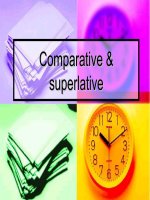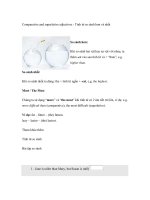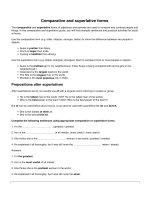Comparative and superlative forms
Bạn đang xem bản rút gọn của tài liệu. Xem và tải ngay bản đầy đủ của tài liệu tại đây (13.42 KB, 2 trang )
Comparative and superlative forms
The
comparative
and
superlative
forms of adjectives and adverbs are used to compare and contrast people and
things. In this comparative and superlative guide, you will find example sentences and practical activities for study
at home.
Use the comparative form (e.g. taller, sharper, stronger, better) to show the difference between two people or
objects.
Susie is
prettier
than Mary.
China is
larger
than India.
Cycling is
healthier
than driving.
Use the superlative form (e.g. tallest, sharpest, strongest, best) to compare three or more people or objects.
Susie is the
prettiest
girl in my neighborhood. (Here Susie is being compared with all the girls in the
neighborhood.)
Greenland is the
largest
island in the world.
The Nile is the
longest
river in the world.
Mumbai is the
most populous
city in India.
Prepositions after superlatives
After superlatives we do not usually use
of
with a singular word referring to a place or group.
He is the
tallest
man in the world. (NOT He is the tallest man of the world.)
Who is the
best
player in the team? (NOT Who is the best player of the team?)
But
of
can be used before plural nouns. It can also be used with quantifiers like
lot
and
bunch
.
She is the fastest
of them
all.
She is the best
of the lot
.
Complete the following sentences using appropriate comparative or superlative forms.
1. I’m the ……………………………… (greatest / greater)
2. Iron is the ……………………………. of all metals. (most useful / more useful)
3. She thinks she is the …………………………… woman in the world. (prettiest / prettier)
4. He explained it all thoroughly, but I was still none the …………………………… (wiser / wisest)
Answers
1. I’m
the greatest
.
2. Iron is the
most useful
of all metals.
3. She thinks she is the
prettiest
woman in the world.
4. He explained it all thoroughly, but I was still none the
wiser.
Be first to know when grammar rules change! Sign up to our newsletter here: englishgrammar.org (It's free)
Powered by TCPDF (www.tcpdf.org)









